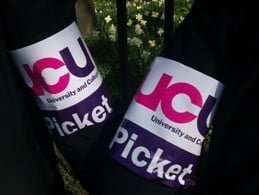Tomorrow, on October 31st, an historic event will take place in Higher Education (HE). For the first time ever, three trade unions are going on strike at the same time – UCU (University and College Union), Unison and Unite. Socialist Appeal supporters will be visiting the picket lines in universities across the country, along with delegations from the Marxist societies, and we encourage our readers to go along and show your support too!
Tomorrow, on October 31st, an historic event will take place in Higher Education (HE). For the first time ever, three trade unions are going on strike at the same time – UCU (University and College Union), Unison and Unite. This joint action reflects the anger of union members who have seen years of below inflation wage increases eat into their standards of living; yet the offer on the table for this year is a 1% wage rise against the backdrop of a 2.7% CPI inflation rate.
At a time when financial reserves in HE are over £1bn, where staff costs as a percentage of income have fallen to 55.5%, and when vice-chancellors are enjoying average pay and pension packages of more than £250,000, HE teaching staff have seen a 13% cut in real income since 2008. Many Unison members too are struggling to survive on low pay, and Unite’s officer for HE, Mike McCartney, estimates that 4,000 workers are paid less than the living wage.
But it is not only wages and conditions that are an issue: there is also the growing use of zero-hour contracts, which threatens job security; entire departments are under threat of closure in universities; and HE pensions have also come under attack in recent times. This latest strike action, therefore, whilst nominally over pay, really represents the accumulated anger that has built up over the past few years amongst HE lecturers and workers, who are facing death by a thousand cuts. This explains the historic decision of Unite and Unison members in HE to join their brothers and sisters in UCU for tomorrow’s strike action.
The gloves are now off, and although all the unions are urging the employers to return to the negotiating table, at the present moment there is no movement. Ballots for strike action have resulted in over 60% majorities, so the task now is to both encourage union members to heed the call and to use the action to recruit new members, as this action will need to mark the start of a sustained campaign.
This one-day strike between the three unions marks an important step forward in the fight againsts cuts to HE. But as we have seen with other public sector strikes recently, one-day actions by individual unions or sectors are not enough. What is needed is for the trade unions leaders to call for a 24-hour general strike to mobilise and galvanise the entire labour movement.
Such an industrial call to action must be accompanied, however, by a political solution. The cuts to HE are part of a wider attack on the working class as a whole, who are being asked to pay for a crisis they did not cause. Defending against attacks on any one sector, therefore, means fighting against the cuts in general – and this requires a political programme. The leaders of the labour movement must tell the truth: to fight the cuts, we must fight for the socialist transformation of society.
Further education ballots to strike
While union members in HE take strike action, in Further Education (FE) too a strike ballot of UCU members is underway. The FE ballot opens on October 31st and closes at midday on November 14th. Ballots will be taking place in more than 250 FE Colleges. In FE the pay rise offer on the table is 0.7%, so it is not surprising that a national consultation exercise showed a majority in favour of balloting for strike action. The task now is to win a positive vote in FE and then, with a favorable outcome, to convince FE staff to come out on the named day.
Just as in HE, FE staff too have taken a hammering on pay and conditions since 2008. Over this period the cost of living has gone up by 17.5% so that real pay for FE staff has gone down by 15%, one of the biggest falls in the post WW2 period. For a member of the lecturing staff on the top of the lecturing grade at Point 8, the cut has been £5,447. For a lecturer half way up the grade on Point 4, the cut has been £4,269. And average FE pay is already £2,000 lower than pay for school teachers, who are already taking magnificent action in defence of their pay and working conditions, especially workloads.
In response to these massive attacks on living standards, the employers’ organisation, the Association of Colleges (AoC), has offered a 0.7% rise, and in return for this benevolence they want national collective bargaining to be given up in favour of local pay and changes to contractual working hours: in other words, even greater attacks on wages, terms and conditions are on the cards as colleges seek to reduce costs due to cuts in government funding. And given that staffing costs are roughly two-thirds of operating costs, here is where further cuts will be made.
Up and down the land FE staff have been hammered over a prolonged period of time with disputes over job losses, pay, workloads, working hours and contractual conditions breaking out in one college after another. Many UCU members are weary and frightened, as they fear that they will be next to go down the road. They saw what happened at Halesowen College in December 2012 and January 2013 when four active UCU members were sacked on spurious grounds. Tribunals over these sackings will be taking place shortly.
In Stoke-on-Trent College, for example, it was reported that teaching staff spend on average 900 hours in the classroom per year, have not had a pay rise since 2008, and that the maximum teaching salary is £24k per year. 900 may not seem much, but when you add on teaching preparation, marking, administration and other tasks associated with teaching, it is a lot and stress levels are rising. In the same college we also have 30 of our members on zero-hour contracts that range from 0 to 18 hours per week.
Yet despite what has been endured, the national mood is that members are ready and willing to fight. In the consultative ballot leading up to the strike ballot, 63% (162 of 258) of FE branches responded, with 85 supporting a strike ballot and 78 rejecting one. However, it was noticeable that the massive majorities in branches for action came mainly from those colleges where union density is greatest and activist numbers are highest. That is why the UCU Further Education Committee (FEC) correctly decided at its October 11th meeting to proceed with the ballot.
Tasks facing the trade unions
What are the tasks that now face the unions in FE? Firstly, we need to convince our members to vote YES for strike action so that when the day is named, we have a unified and united response to the employers’ offer. That will not be an easy task, but it is one that can be accomplished, for a negative vote could set the union back in FE. In addition, whilst the national mood overall is for action, regionally there are differences.
In the West Midlands, for example, 21 out of 35 branches were against even balloting for strike action with only 8 in favour. Another three branches had voted to accept the miserly offer, knowing full well that it would mean an even further cut in living standards for our members. One branch even voted against the offer, but then also voted against action to try and improve the offer! This is a reflection of the state of morale in one region, but nationally the picture is far more positive. Morale nationally and regionally can be lifted with a positive ballot, a mass adherence to the result and united action on picket lines and demonstrations.
Secondly, the issue of union membership needs to be emphasised during this dispute. In short, we need to build our membership by recruiting during the action, as we have explained previously. UCU is losing members due to redundancies. In the West Midlands the rate of loss is slowing – from July 2011 to July 2012 it fell by 4.15%, but from July 2012 to July 2013 by only 3.42%, yet it is still falling and we as a union cannot afford to lose more members. At the moment we are bridging the gap between UCU income and expenditure by raising subs, yet we also know that in the long term this is not sustainable, as we lose members who cannot afford the new subs levels. The only answer is therefore to recruit by campaigning and winning, so that those who are not yet members can see that the UCU can make a difference to their working lives.
That is why this dispute must be won – and it can be. In HE, an initial 50.3% consultative vote in favour of action was turned into a 62% vote in the actual ballot by effective campaigning and explaining of the issues amongst the members. Every victory will boost morale. For example, in South Staffordshire college, the attempts by management to impose severe changes to existing contracts, changes that would include a massive attack on sickness rights and pay, led to massively attended union meetings, which agreed to enter into dispute with management. For the moment the plans have been withdrawn, but with further budget cuts on the horizon, management will once again try to introduce cost cutting measures that attack pay and conditions. We saw that a show of strength and determination by UCU members repelled management aggression.
In Solihull College too, UCU member strength has meant a newly negotiated pay structure that ensures progression to point 8 on a scale that was agreed nationally back in 2003! In City and South Birmingham College it has been agreed to evaluate a new ungraded classroom observation scheme that includes a week’s notice of observation, a two-day window when these can take place, and an end to practices that are prevalent elsewhere where observers, very often from management who have not been in the classroom for years, can suddenly walk in, sit down and observe.
The gains in these three colleges, small that they may seem in the grander scheme of things, are significant in that they give members confidence that a show of unity and strength can win concessions. We need the same unity and strength over the pay claim. We need to win this battle, enthuse our members, recruit during the action and build our membership.
Posing the socialist alternative
Ultimately, however, austerity is predicted to continue until at least 2020 as attempts are made to cut the yearly government deficit and the overall debt. As a result, we can expect further attacks on pay and conditions in HE, FE, and the rest of the public sector.
During this dispute we must, therefore, raise the issues of: who owns and controls our colleges and universities? What is their purpose in a situation of capitalist crisis? Who pays for them and how they could really function to meet the needs of society as a whole if the means of producing wealth were socially owned? That raises the issue of the role of education in a socialist society.






